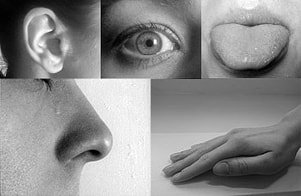Touch, Touching
 Touch, a word associated with the senses, has a multitude of meanings and uses. The verb ‘to touch’ comes from Latin toccare (to knock, to strike, to strike a bell); touch is something that gets your attention. From Latin comes Old French tochier (to touch, hit, knock, mention, deal with) and, in the late 13th century, the word touch comes to English.
Touch, a word associated with the senses, has a multitude of meanings and uses. The verb ‘to touch’ comes from Latin toccare (to knock, to strike, to strike a bell); touch is something that gets your attention. From Latin comes Old French tochier (to touch, hit, knock, mention, deal with) and, in the late 13th century, the word touch comes to English.The verb touch is used in many ways. Touch, meaning ‘to border on’ or ‘to mention or describe’, is from the 14th century. Touch, meaning to bring into physical contact, to perceive by physical contact, to examine by touch is also from the 14th century. Our senses are the ways in which we touch and are touched by things in our environment.
In addition to the senses, to be ‘touched’ is to be affected or moved mentally or emotionally or spiritually; i.e., the mind or heart has been touched. This use of the verb touch is also from the 14th century. The word ‘touching’, meaning something affecting the emotions, is from around 1600.
The word touch is used in many ways to describe ways in which we are so touched. I’ll now touch on some of these. The noun touch, from around 1300, comes from Old French toche (touch, a touching, a blow, an attack). Touch, meaning a slight attack (of an illness; e.g., ‘a touch of the flu’) is from the 1660s. To be ‘in touch’ or ‘out of touch’ is from 1884. Touch, in the sense of a skill or aptitude in some topic (e.g., art, music), is from 1927. To call someone a ‘soft touch’; i.e., easily manipulated, is from 1940.
Touch and go. Touchdown. Touch a chord. Touch base. The common touch. To lose one’s touch. Magic touch. Don’t be so touchy. Final touch. Touch up. Touch a nerve. Lose touch. A touch of class. I wouldn’t touch it with a ten-foot pole.
Does any of this ring a bell with you?
Also: Touchy, Elizabeth Bradfield
https://www.theatlantic.com/magazine/archive/2020/07/elizabeth-bradfield-touchy/612262/
Reference: Online Etymological Dictionary, https://www.etymonline.com/
Published on September 11, 2020 11:59
No comments have been added yet.



